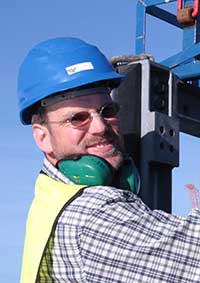Ehemaliger Prof. Dr. Tobias MÃķrz
Unser praxisnahes und interdisziplinÃĪres Forschungsgebiet umfasst Bereiche der Bodenmechanik, Geotechnik, Sedimentologie und Geophysik.
Grundlagenforschung:
In der Grundlagenforschung stehen Fragen zur KÞsten- und Schelfgeologie und zur Sedimentmechanik im Vordergrund. Untersucht werden:
(1) die komplexe, quartÃĪre Entwicklungsgeschichte des heutigen Nordseegebietes. Dabei werden klassische Methoden der geophysikalischen und sedimentologischen Meeresbodenerkundung mit geotechnischen Methoden, wie der Drucksondierung (CPT) und Elementversuchen, kombiniert;
(2) verschiedene Bodeneigenschaften, wie das VerflÞssigungspotential wÃĪhrend zyklischer Belastung, z. B. durch Erdbeben oder Pfahlrammungen sowie der Einfluss von Verwitterung vulkanischer Aschen auf die HangstabilitÃĪt.
Angewandte Forschung:
(1) Entwicklung innovativer Methoden fÞr die geotechnische Untergrunderkundung im Feld. Dazu zÃĪhlen z. B. das Geotechical Offshore Seabed Tool (GOST) und eine mobile Vibro-CPT-Landeinheit.
(2) Entwicklung von geotechnischen TeststÃĪnden zur Charakterisierung von Sedimentproben im Labor. Dazu zÃĪhlen eine CPTu-Testkammer und eine zyklische Triaxialkammer.
(3) Einsatz und Weiterentwicklung numerischer Modelle zur Simulation komplexer Boden-Bauwerksinteraktionen.

Grundlagenforschung:
In der Grundlagenforschung stehen Fragen zur KÞsten- und Schelfgeologie und zur Sedimentmechanik im Vordergrund. Untersucht werden:
(1) die komplexe, quartÃĪre Entwicklungsgeschichte des heutigen Nordseegebietes. Dabei werden klassische Methoden der geophysikalischen und sedimentologischen Meeresbodenerkundung mit geotechnischen Methoden, wie der Drucksondierung (CPT) und Elementversuchen, kombiniert;
(2) verschiedene Bodeneigenschaften, wie das VerflÞssigungspotential wÃĪhrend zyklischer Belastung, z. B. durch Erdbeben oder Pfahlrammungen sowie der Einfluss von Verwitterung vulkanischer Aschen auf die HangstabilitÃĪt.
Angewandte Forschung:
(1) Entwicklung innovativer Methoden fÞr die geotechnische Untergrunderkundung im Feld. Dazu zÃĪhlen z. B. das Geotechical Offshore Seabed Tool (GOST) und eine mobile Vibro-CPT-Landeinheit.
(2) Entwicklung von geotechnischen TeststÃĪnden zur Charakterisierung von Sedimentproben im Labor. Dazu zÃĪhlen eine CPTu-Testkammer und eine zyklische Triaxialkammer.
(3) Einsatz und Weiterentwicklung numerischer Modelle zur Simulation komplexer Boden-Bauwerksinteraktionen.

Numerisches Model eines Hanges mit BodenverflÞssigung (Material Point Method). Studierende wÃĪhrend einer Beprobung an einer Rutschungszone in Neuseeland.
Prof. Dr. Tobias MÃķrz

1996 Diplom, Eberhard Karls UniversitÃĪt TÞbingen; 1996-2003 GEOMAR-Forschungs-zentrum, Kiel; 1997 Foschungsaufenthalt am Bedford Institute for Oceanography (AGSC), Halifax, Kanada; 2001 Promotion in Geologie, Christian-Albrechts-UniversitÃĪt, Kiel; 2003-2008 Juniorprofessor und seit 2008 Professor, UniversitÃĪt Bremen; 2009-2019 Leiter der Arbeitsgruppe am Standort Bremen, Fraunhofer IWES.
Professor in Bremen 2008 bis 2024
Arbeitsgebiete:
PalÃĪolandschaft der Nordsee, vulkanische Ablagerungen in Neuseeland, angewandte geotechnische Onshore- und Offshore-Vorhaben in Deutschland und Europa.
tmoerz marum.de
marum.de
Fachbereich Geowissenschaften
der UniversitÃĪt Bremen
Klagenfurter StraÃe 2-4
28359 Bremen
Prof. Dr. Tobias MÃķrz

Fachbereich Geowissenschaften
der UniversitÃĪt Bremen
Klagenfurter StraÃe 2-4
28359 Bremen tmoerz marum.de
marum.de
der UniversitÃĪt Bremen
Klagenfurter StraÃe 2-4
28359 Bremen tmoerz
 marum.de
marum.deLebenslauf
1996 Diplom, Eberhard Karls UniversitÃĪt TÞbingen; 1996-2003 GEOMAR-Forschungs-zentrum, Kiel; 1997 Foschungsaufenthalt am Bedford Institute for Oceanography (AGSC), Halifax, Kanada; 2001 Promotion in Geologie, Christian-Albrechts-UniversitÃĪt, Kiel; 2003-2008 Juniorprofessor und seit 2008 Professor, UniversitÃĪt Bremen; 2009-2019 Leiter der Arbeitsgruppe am Standort Bremen, Fraunhofer IWES.Professor in Bremen 2008 bis 2024
Arbeitsgebiete:
PalÃĪolandschaft der Nordsee, vulkanische Ablagerungen in Neuseeland, angewandte geotechnische Onshore- und Offshore-Vorhaben in Deutschland und Europa.
tmoerz
 marum.de
marum.de
